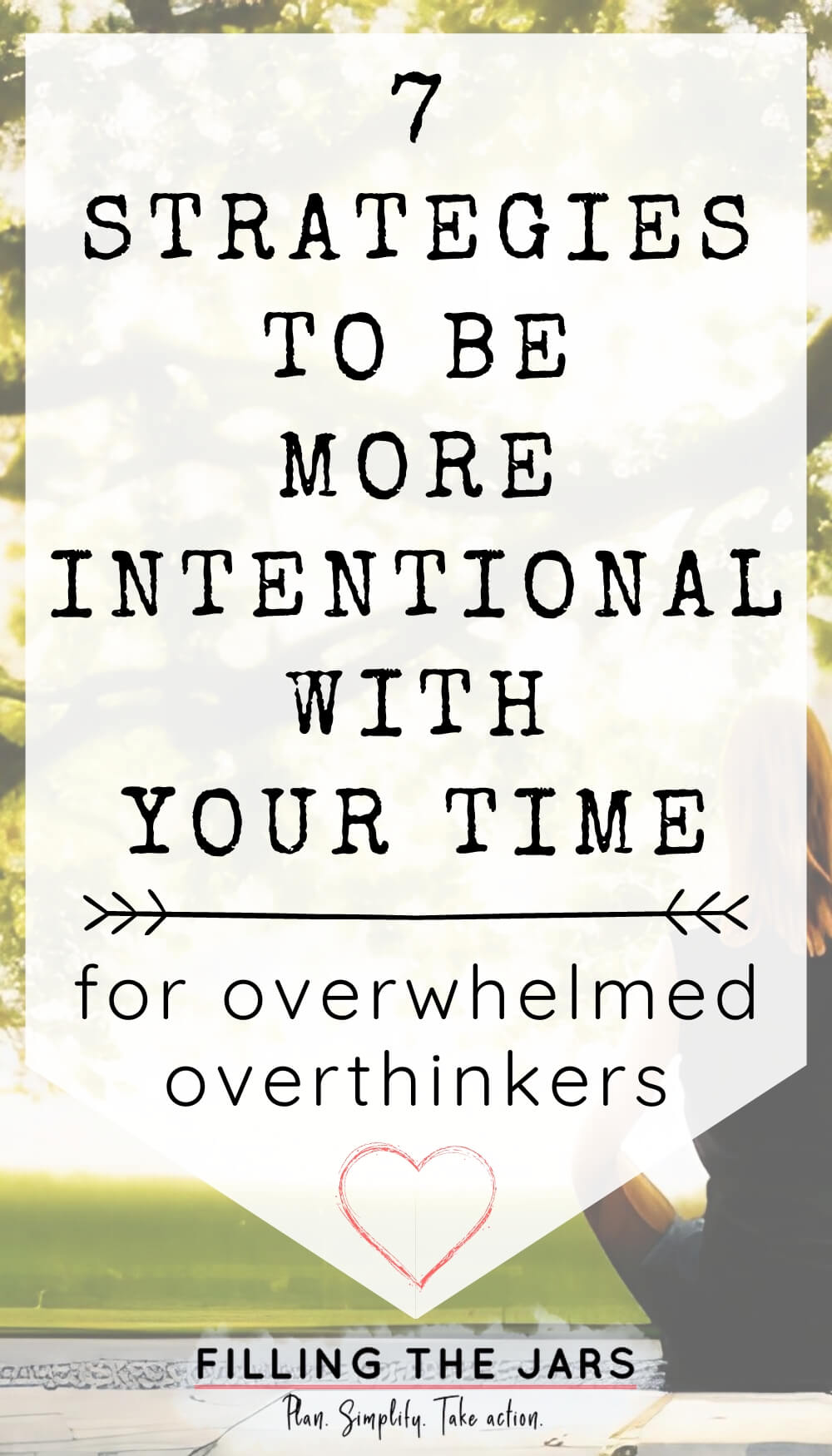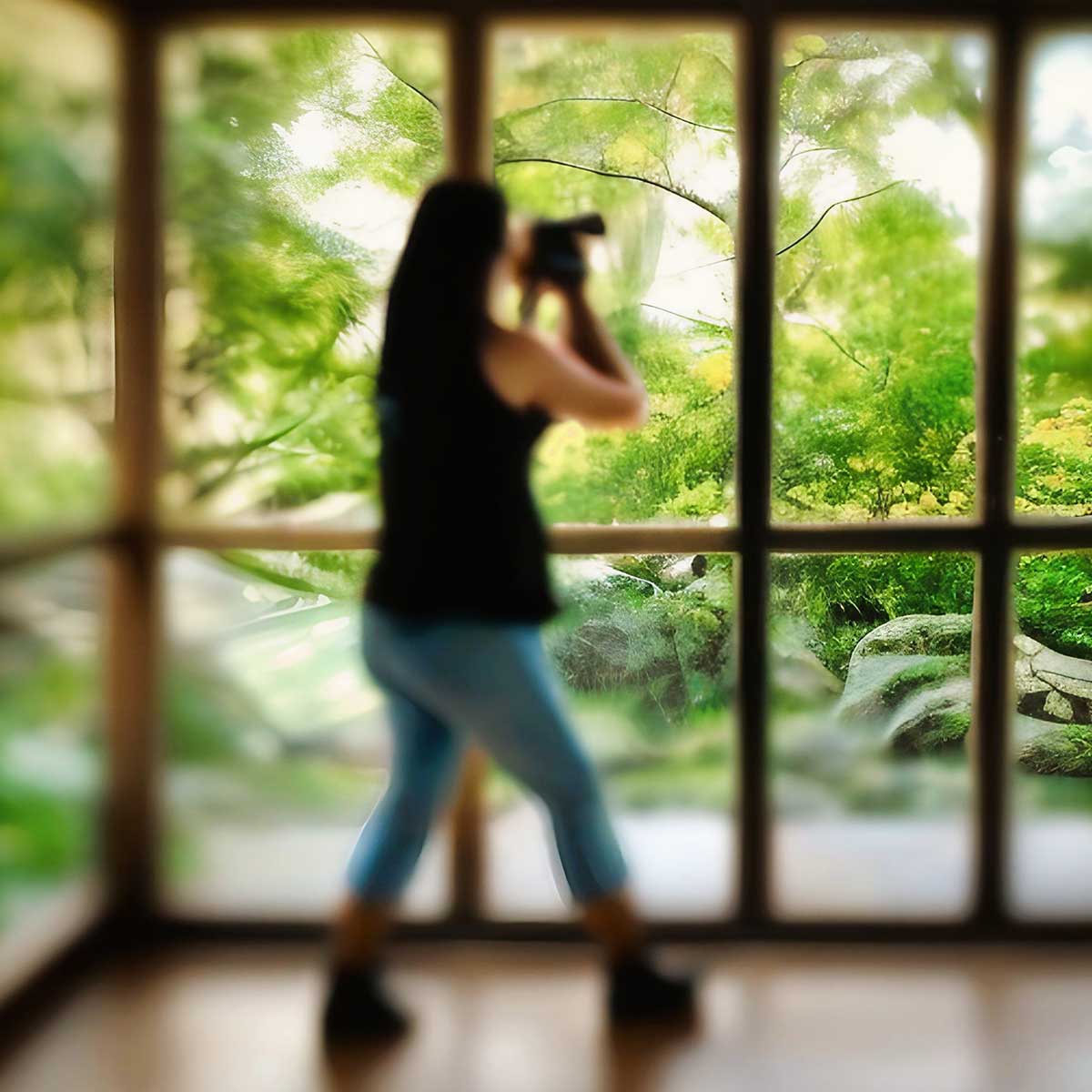We all have the same 24 hours in a day, yet some people seem to accomplish more in less time than others. If you’re an overthinker, learning how to be intentional with your time is key to maximizing productivity, minimizing stress, and living a fully intentional life.
But where do you start? We’ll discuss the 7 strategies I use to make the most of my time and minimize the chaos of overthinking…

This post may contain affiliate links. If you choose to purchase through an affiliate link, I may receive a small commission at no additional cost to you. This post is not to be taken as professional medical or mental health advice. All statements are strictly my personal life observations. You can see my full disclaimer here.
What It Means to Be Intentional With Your Time
Being an overthinker can be a real struggle, especially when it comes to feeling overwhelmed with daily brain chaos.
When I’m experiencing this, it’s like chasing squirrels on steroids. It feels like all of my thoughts are running in circles and I can’t seem to get myself together. I’m sure you can relate!
I find myself constantly worrying about the future and replaying past events or conversations in my head. I also doubt myself over every.little.task. This makes it hard to stay focused and productive.
Intentional living is a concept I’ve begun practicing in my own life as an overthinker. It’s about being mindful of how we use our time and energy.
For me, it starts with setting boundaries for myself, so that I can create structure in my life and not get lost in endless rumination.
It also helps to plan ahead — having something concrete to work toward each day and week gives me a sense of direction and purpose.
Setting aside specific times for work and rest helps me stay focused. And even on the days when I can’t focus well, I don’t let myself get bogged down in endlessly trying to finish something when it obviously just isn’t going to happen.
Finally, being intentional has allowed me to be more mindful of how I spend my time. Instead of worrying about things that are out of my control, I can focus on what’s within my power to do on any given day.
By being intentional with my time, I’m able to create a life of greater peace and purpose. Intentional living is about making the most of each moment, so that we can make the most of our lives.
Being more intentional with time won’t completely solve overthinking or overwhelm, but it certainly can help! Here are the 7 strategies that work the best for me, and I hope they’ll also help you!
Strategies To Be Intentional With Your Time

By utilizing the following strategies for being more intentional with your time, you can become an effective-enough time manager and be intentional with how you spend your days.
1. Practice mono-tasking
Mono-tasking is a great way to be more intentional with your time and energy. It involves focusing on one task at a time, instead of attempting to multitask — which can be distracting and unproductive.
For overthinkers, mono-tasking can help reduce stress and anxiety caused by trying to do too many things at once. It helps to break the cycle of constant thought-switching and worrying that you’re dropping the ball on other tasks (like forgetting to switch the laundry or take something out of the oven). This way, you can make sure that the ONE task you’re working on is being completed to the best of your ability.
By practicing mono-tasking and being intentional with our time, we can be just as productive and feel less stressed out about our workload.
But how do you go from multi-tasking to mono-tasking without worrying that you’re not actually being productive? Well, keep reading, because it works together with the other strategies for being intentional with time…
2. Create a daily routine
Creating a daily routine is one of the best ways to be intentional with your time. Having a routine helps you stay focused on what needs to be done, and it can also help reduce stress levels.
Here are some tips for creating daily routines that work for you:
Start by building your own perfect morning routine, which should include setting a goal for the day. Even if it’s something small like reading one chapter of a book or doing one load of laundry, having a goal helps keep you focused on what you MUST accomplish.
Next, create a to-do list that includes all the tasks you want to do during the day — such as cleaning your room, writing emails, or working on a project. With this list in hand, you can prioritize each task according to importance and urgency.
Then, prioritize the tasks on your list according to importance or urgency. If a task isn’t necessary right away, consider moving it to another day so that it doesn’t get in the way of more important tasks.
Use timers or alarms to remind yourself when it’s time to move on to another task. This is absolutely imperative to help ensure you don’t lose track of time while working on something — or that you don’t get distracted for too long. 😉
Don’t forget to take regular breaks throughout the day! Whether it’s going for a walk or listening to music, taking breaks will help keep your mind sharp and motivated.
Finally, try to stick with healthy habits throughout the day such as eating nutritious meals and getting enough sleep. Doing so will give you more energy and help ensure that you stay productive until bedtime.
We all have different lifestyles and responsibilities so creating a daily routine might look different depending on who you are. But with plenty of practice and some organization, following a daily routine can help make every day go that much smoother!
3. Prioritize tasks without guilt or doubt
Prioritizing tasks is an important part of staying organized and productive. I know everyone always says to focus on the most important tasks first so that you can get the most out of your day. But sometimes that’s *really* hard to figure out… and spending an hour or two ‘prioritizing’ really defeats the purpose of being intentional with your time.
When it comes to prioritizing, I like to start by making a list of all my tasks. In other words, I do a brain dump. Then I give myself a HARD time limit — like 5 minutes or less — to decide what actually needs to get done and what my main focus for the day will be.
How to prioritize tasks effectively
- Understand your goals
Prioritizing tasks effectively starts with understanding your goals. What are you trying to achieve? Do you need to finish a project by a certain date? Or do you just want to make sure that everything is taken care of at some point during the day? Once you have identified your goals, it will be much easier for you to put your tasks in order.
- Prioritize the order of tasks
Once you know what your goals are, it’s time to start prioritizing. Start with the tasks that will have the biggest impact on achieving your goal or those that need to be completed right away.
For example, if you’re trying to finish a project by a certain date, focus on completing the parts of the project that are due soonest. This will ensure that everything is done in time and help keep you on track.
- Create deadlines for yourself
Creating deadlines for yourself can also help in prioritizing tasks effectively to better manage your time and stay organized. This can help prevent procrastination from being too much of an issue.
If something urgent pops up during the day, I know that I’ll have to adjust my priorities accordingly. I try to be flexible and understand that sometimes doing those ‘other’ things really is being intentional for that day.
Prioritizing tasks may take some practice at first but once you get into the habit it becomes second nature! Take it day by day, make your best decisions, and you’ll get the hang of it.
But now, how do you actually get those tasks done?
4. Use time-blocking

Time-blocking is the practice of setting aside specific chunks of time each day to focus on specific tasks. This technique can help reduce the tendency to get stuck in the details and procrastinate, as you know exactly when and how much time to dedicate to each task.
For example, if you have a project due in a week and you know that setting aside an entire day won’t work, you might decide to allocate two hours per day for five days to work on it so that it’s finished in time.
To make this process easier, try breaking down each working chunk into a mini set of tasks for the project. For example, if you’re working on writing an article or a report, break it down into smaller parts like researching sources, writing out the draft, and then editing before submitting it.
Time-blocking also helps keep distractions at bay. By setting aside certain times for specific activities, you can avoid distraction from other activities or tasks that may be vying for your attention. This means you have a better chance of succeeding with intentional focus.
Be sure to plan healthy breaks throughout the day — take a few minutes here or there to rest your mind and reset your focus. Grab my printable daily planner page so you can practice creating your own time-blocking schedule.
Additionally, try blocking off certain times for self-care activities such as reading or exercising. This helps ensure that you’re taking care of yourself and being very intentional about ALL of the time you have each day.
5. Use a productivity system or app
Productivity systems and apps can be a great way to stay organized and make the most of your time.
Popular tools such as Todoist, Trello, and Asana are used by many professionals to manage their day-to-day tasks. These systems provide users with the ability to create lists, assign deadlines, set up recurring tasks, track progress over time, visualize workflows using Kanban boards or Gantt charts, and much more.
With these tools, you can stay on top of your work and ensure that things aren’t slipping through the cracks. Whether you need to plan out projects or just remember to buy milk at the store, productivity systems can help reduce the amount of overthinking you do every day.
Using a productivity system or app properly is key to making the most of your time. Start by customizing the system to fit your own workflow—this includes setting up reminders for yourself as needed—and then use it consistently throughout the day.
You can also keep your ‘productivity system’ super-simple with a physical planner (my favorites are Tools4Wisdom and Erin Condren) or a to-do list and a standalone timer or alarms set on your phone.
You may even want to consider scheduling specific times each day when you check in on your progress and yourself. This will help ensure that all of your tasks get done on time, you remain on track with your plans, and you’re not just sitting there all day overthinking everything.
Those check-in times are perfect for the next strategy, mindfulness and thought work…
6. Practice mindfulness and do thought work

Mindfulness is a simple yet powerful practice that involves being present in the moment. It helps us become aware of our thoughts and feelings, as well as the environment around us. Along with thought work, this awareness allows us to recognize our patterns of thinking and better manage our emotions.
For overthinkers, mindfulness can be a game-changer. It gives us a sense of peace and clarity in our lives, allowing us to learn to react to our thoughts and actions in healthier ways. With practice, it can help us to lessen overwhelm and those days of spinning thoughts… which means we can be more intentional much more often.
Here’s how you can begin practicing mindfulness:
- Start by focusing on your breath for a few moments.
- Feel the air entering and leaving your lungs, and pay attention to the physical sensations associated with breathing.
- Once you’ve established that connection, try to extend it outward into your surroundings.
- Notice the colors and textures of your environment or the sounds you hear around you.
- As thoughts come up, acknowledge them but don’t get too caught up in them — just observe them neutrally before gently returning your focus to your environment.
Mindfulness doesn’t have to take long — even 5 minutes of mindful awareness each day can make a difference! With regular practice, you’ll find that mindfulness might become second nature and can help you stay present during challenging times as well as allow you to enjoy life’s simple pleasures more fully.
No matter what, as an overthinker, you’ll have a LOT of thoughts and emotions that arise, which is a great opportunity to start doing personal thought work.
I know how easily our thoughts can take control and overwhelm us. Despite my best efforts to stay in control and be intentional with my time, I can still find myself feeling overwhelmed by the daily chaos in my head. It’s important to recognize these feelings and acknowledge that they’re part of being an overthinker.
Either after a mindfulness session or whenever you find yourself NOT doing the tasks you know need to be done, journal about your thoughts and feeling. Try not to judge or criticize what comes up — just observe it with curiosity and acceptance.
When I find myself feeling out of control and overwhelmed, I take a step back and remind myself that these feelings are normal. Instead of trying to push them away, I try to work through them so that I can better understand where they’re coming from. By acknowledging the challenges of being an overthinker and working on how I deal with those thoughts, I can often move forward more effectively.
I hope that with this practice, you’ll learn how to bring yourself back to the moment and being intentional instead of worrying about what might happen in the future or overthinking the past.
7. Put your phone down!
I really think the worst time thief we all deal with every day is our phones. We can pretend that they ‘keep us connected to friends and loved ones’ and that they ‘help us be productive’ with reminders or digital calendars, but let’s be completely honest…
Most of us are on our phones for HOURS every.single.day. — and very little of that time is spent being intentional.
Not only are we wasting time, but often the things we do our phones — hello, social media! — contributes to our overwhelm and overthinking. We compare everything about our lives to what we see online and worry that we ‘should’ be so much more.
Stop it.
Put the phone away, turn off notifications, delete social media apps, unplug from technology… whatever it takes to pull yourself away from the inferno of information. Take time to breathe and get back to being YOU and being intentional with your time and your life.

More Intentional Living Inspiration
9 Nightly Journal Prompts To Bring An Intentional End To Your Day
Quiet: The Power of Introverts in a World That Can’t Stop Talking – by Susan Cain
Declutter Your Life: 6 Things to Purge for More Intentional Living
24 Intentional Living Quotes to Inspire Your Best Life
Concluding Thoughts…
Making conscious efforts to use your time wisely can have a major impact on how much you accomplish and on how you feel at the end of every day. Don’t buy into the misconception that you need to become a time management expert in order to be successful — you just need the right strategies and tools that work for your lifestyle! That’s why it’s important to be intentional with how you use your time.
We’ve discussed a few strategies that you can use to make the most out of every day, such as using productivity systems and apps, creating lists, time-blocking, and pausing for mindfulness and thought work. All of these ideas work together to help you stop overthinking quite so much AND to be more intentional with your time and energy.
Even small changes in the way we use our time can add up to make a big difference in our intentional living journey, so don’t be afraid to challenge yourself to try the strategies we discussed in this post.
Keep what works, ditch what doesn’t as you Build Your Best Life.
You’ve got this!
Did you enjoy this post? Know someone else who might like it? Please take a moment to share on Pinterest, Facebook, or your favorite social media… (Click the sharing buttons at the bottom of the post.) Thank you!

